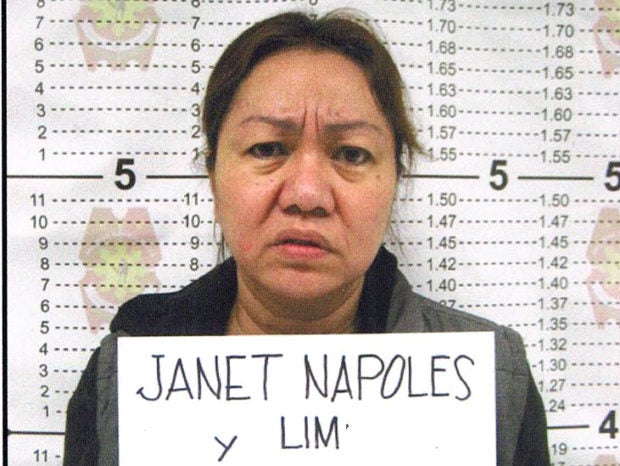Sandiganbayan convicts Napoles, ex-Davao lawmaker for graft over PDAF
MANILA, Philippines — A former lawmaker of Davao del Norte’s first district and pork barrel scam alleged mastermind Janet Lim Napoles have been found guilty of graft by Sandiganbayan.
The decision pertains to cases involving the appropriation of funds to a fake non-government organization (NGO).
In a decision from the Second Division posted in the Sandiganbayan website on Friday, former Davao del Norte 1st District representative Arrel Olaño, Napoles, and other co-accused were found guilty for three counts of graft and three counts of malversation of public funds.
Olaño, Napoles, and two other accused were sentenced to imprisonment of six to ten years.
The issue involved the funneling of Priority Development Assistance Fund (PDAF) to Countrywide Agri and Rural Economic Development (CARED).
CARED is one of the bogus NGOs that Napoles set-up, together with her former right-hand man Benhur Luy, with the purpose of siphoning funds from a lawmaker’s PDAF to the organization.According to the charges against Olaño, Napoles, and the others, P2 million from the ex-lawmaker’s PDAF was allocated to CARED under the guise of a livelihood project for barangays.
Olaño was also convicted for direct bribery, as it was proven that he received P3.175 million from Napoles for allocating P8.5 million, P2 million, P4 million, and P2.5 million to CARED and Philippine Social Development Foundation Incorporated (PSDFI).
“It was established that Olaño exercised control over the release of his PDAF. He initiated the release of the funds by unilaterally (endorsing CARED and PSDFI to implement supposed certain projects,” the Second Division stated in a decision penned by Associate Justice Edgardo Caldona.
“Accused Olaño failed to justify the reason why he endorsed (the) said NGOs, which was clearly established as fake, unqualified, and/or unaccredited,” the resolution explained.
“Further, Luy testified on the manner by which PDAF is diverted to accused Napoles through the selection and endorsement of the lawmakers of Napoles’ NGOs to be the project implementer of the former’s PDAF,” the ruling noted.
“The transactions funded by the PDAF of accused Olaño were considered irregular and illegal after special audit for being violative of existing laws, rules, and regulations and for being unliquidated,” it stressed.
The anti-graft court also took notice of Olaño receiving kickbacks from Napoles, which were recorded on a daily disbursement record (DDR).
“In this case, Luy testified that accused Olaño received kickbacks and commissions from the illegal scheme that he agreed upon with accused Napoles through Ducut. Accused Olaño’s receipt of kickbacks and commissions is recorded in the DDR of JLN (Janet Lim Napoles) Corporation,” Sandiganbayan stated.
Ducut referred to former Energy Regulatory Commission chairperson Zenaida Ducut who was reportedly the bagman of Napoles.
“These DDR entries were confirmed by the Anti-Money Laundering Council in its official Bank Inquiry Report using official bank records,” it added.
Aside from Olaño and Napoles, also found guilty in the graft case are legislative liaison officer Maria Rosalinda Lacsamana and private individuals Mylene Encarnacion, and Evelyn de Leon.
Olaño, Lacsamana Napoles, and Encarnacion were sentenced to six years and one month up to ten years of jail time.
The four were also ordered to return jointly and severally P1.89 million to the National Treasury.
Meanwhile, Olaño, Lacsamana, Napoles, and de Leon were sentenced to six to ten years of prison time for two other graft cases.
They were also instructed to return P3.83 million and P2 million to the National Treasury.
All five have been perpetually barred from holding public office.
RELATED STORIES:
Napoles cleared in one pork barrel case but convicted in another
Sandiganbayan acquits Napoles in 16 graft raps over pork barrel scam
APL
Disclaimer: The comments uploaded on this site do not necessarily represent or reflect the views of management and owner of Cebudailynews. We reserve the right to exclude comments that we deem to be inconsistent with our editorial standards.

